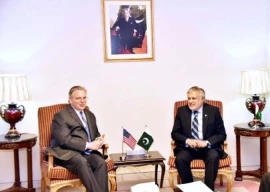
KARACHI:
Socialism has failed, capitalism is under stress and the only way to get out of the current morass is to come up with self-sustaining business models for those segments of society that the free-market economy has failed to serve, Acumen Fund Pakistan (AFP) board chair Zaffar Khan said while addressing AFP’s annual community gathering on Saturday.
AFP is a global non-profit venture capital fund that uses entrepreneurial approaches to address problems of water, healthcare, housing, agriculture, energy and education by raising philanthropic capital and investing in social enterprises.
“It’s a question of economic inclusiveness. We need a paradigm shift that seeks to blend commercial with compassion. Charity alone won’t solve our problems,” he said while emphasising the need for social entrepreneurship that uses innovative business models to provide low-income groups with basic services at affordable prices.
AFP works with different companies, including Citigroup, Abraaj Capital and JS Group and has approved investments of $15 million in 13 organisations in Pakistan since 2002.
In his keynote address, Engro Corporation CEO Asad Umar disagreed with Khan over the ability of the government and the free-market economy to lift a huge number of people out of poverty. He said social entrepreneurship could not end poverty by itself, which made the task of reforming the state unavoidable.
“Social entrepreneurs should work to improve the focus, quality and delivery of state institutions to address the unmet needs of the poor, which do not have market-based solutions,” Umar said.
Highlighting the benefits of public-private partnership in the fields of healthcare, housing, agriculture, energy and education, Pakistan Poverty Alleviation Fund (PPAF) Chairman Hussain Dawood, who also serves as AFP partner, said people had been relying too much on the government to come to their aid.
“Civil society should step in and work with the government to solve these issues,” he said, adding PPAF was the best example of public-private partnership, as it operated in 87,000 villages and was run by a small group of 220 professionals only.
He said professionals working in the social sector deserved remuneration in line with the going market rate. “If you pay peanuts, you’ll get monkeys.”
Attributing the dismal state of education in Pakistan to the nationalisation policy of the 1970s, Dawood asked the government to declare the education sector tax-free. “The best way to attract investors to a sector is to make it tax-free. Funds come in and the sector gets developed.”
Besides a panel discussion on building the social enterprise space in Pakistan, the community gathering also included several presentations by organisations, which have received funding from AFP.
One such social enterprise is NRSP Microfinance Bank, which provides crop and livestock loans and savings and insurance products in addition to working capital to farmers at financing rates up to three times cheaper than those available from informal moneylenders. It has disbursed over $30 million in credit to more than 127,000 borrowers.
Published in The Express Tribune, February 5th, 2012.























































COMMENTS (1)
Comments are moderated and generally will be posted if they are on-topic and not abusive.
For more information, please see our Comments FAQ